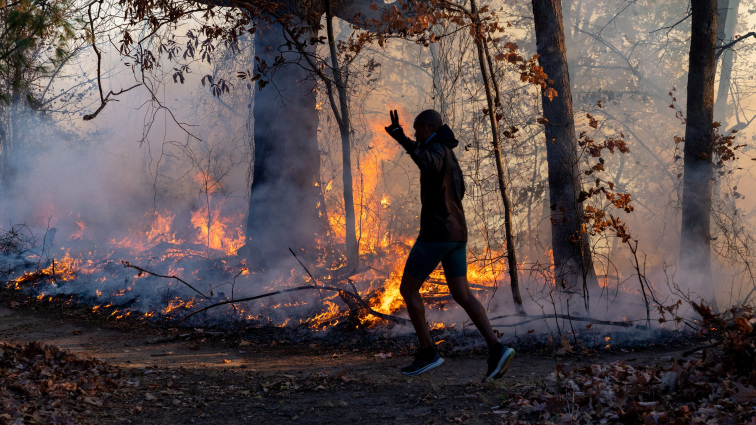In November 2024, tens of thousands of university students from Zhengzhou, Henan, rode their bikes at night to Kaifeng, with some students waving banners for "freedom." (Video screenshot)
[People News] On a certain night in June, four female university students from Henan province suddenly had a craving for Kaifeng's "Soup Dumplings," so they decided to "ride to Kaifeng at night." Their video sparked a trend of "night rides to Kaifeng," involving over 200,000 students, spreading gradually from Henan to Beijing and causing extreme panic within the CCP, which began blocking student movements. Analysts suggest that the "night ride to Kaifeng," like the "Blank Paper Revolution," has put the CCP in a state of panic. Though initially suppressed, this trend may spread nationwide, potentially leading to a major collapse of the CCP.
The "night ride to Kaifeng" by four female university students from Henan garnered significant attention and heated discussion. Many students joined in, with participation growing larger and reaching a spectacle of hundreds of thousands. Some students shouted slogans unrelated to the soup dumplings along the way, such as "Long live the Chinese nation, long live the People’s Republic of China."
By the early hours of November 8, the night ride activity had reached an unprecedented scale, with more than 600 students from Beijing gathering at Zhengzhou High-Speed Rail Station to head to Kaifeng. Videos on social media showed that in addition to university students, there were also groups of veterans participating, holding flags, with some shouting "freedom." Veterans expressed boldly during the ride: “Eight years in the Rocket Force, riding to Kaifeng, charge!” and “Five years in the Air Force, retired but still proud, riding to Kaifeng, go!” The night ride to Kaifeng has evidently become a symbolic activity showcasing the power of youth.
A blogger from Shandong posted a video on Douyin, saying, "The night rides are now under strict investigation not only in Henan universities but also in Shanxi and Shaanxi. From the videos I’ve seen, students from Shandong and Tianjin are also planning to take action, and now some are even waving the national flag."
Initially, the CCP’s official rhetoric encouraged the night ride as a youthful, passionate journey. However, this soon triggered the CCP's sensitive nerves, fearing that students across various regions might imitate it. On November 9, authorities urgently ordered a complete ban. Subsequently, universities across Henan announced campus lockdowns, sparking student dissatisfaction.
On November 9, Henan authorities issued an emergency order, mandating several universities to implement closed management, prohibiting students from leaving campus. Simultaneously, education departments in various regions issued bans to prevent students from participating in riding activities. The Shanxi Provincial Education Department urgently notified universities to check if any students were planning to travel to Henan, and in Taiyuan, they even ordered a ban on students leaving the urban area.
The X platform account “Voice of Hope - China Situation” shared a video stating that after the large-scale night rides by university students, the Zhengzhou city government decided to introduce a policy banning "non-motorized vehicles" from the roads to prevent students from continuing the "night rides." Faced with the government’s ban, some students chose to walk instead, continuing to head towards Kaifeng at night. Meanwhile, the account “News Investigation” also posted a video claiming that the Kaifeng city government dispatched a large police force to prepare to expel those Henan university students attempting to ride to Kaifeng.
A retired teacher from Zhengzhou, Ms. Jia, said in an interview with Radio Free Asia on Sunday (10th) night, "The road from Zhengzhou to Kaifeng was packed with people. I estimate there were at least 200,000 people; the Zheng-Kai (Zhengzhou to Kaifeng) avenue was crowded beyond belief. Students left directly from their schools, and all the shared bikes were taken. Those who couldn’t ride bikes went on foot. The government is very nervous. But I wonder, what’s the big deal with people going for a walk on the street?”
On the X platform, the account “Yesterday” shared a video stating that following the night ride to Kaifeng involving tens of thousands of university students, many universities in Henan province adopted a "campus lockdown" strategy, preventing students from going out and even questioning some students. Meanwhile, some food vendors near campuses, affected by the campus lockdowns, gathered to protest nearby, and some angry vendors even pushed down the rear gate and wall of Anyang College in Anyang, Henan.
The account “Voice of Hope - China Situation” shared another video stating that after the large-scale night rides by university students, the Zhengzhou city government decided to introduce a policy banning "non-motorized vehicles" from the roads to prevent students from continuing the "night rides." In response to the ban, some students chose to walk instead, continuing to head towards Kaifeng at night. Meanwhile, the account “News Investigation” posted a video stating that the Kaifeng city government dispatched a large police force to prepare to expel Henan university students attempting to ride to Kaifeng.
The account “Face History. Spread Truth” shared a video claiming that the night ride trend in Henan has spread to Beijing, with some people riding shared bikes towards Tiananmen Square.
In response, independent commentator Cai Shenkun said on his self-media program on November 10 that the CCP has an inherent fear of such spontaneous mass activities, whether it was the “April Fifth Movement,” “June Fourth,” or the “Blank Paper Movement” during the pandemic. These movements ultimately led the regime into a state of panic. The night ride gathering of university students in Zhengzhou, though seemingly a senseless “budget travel,” in reality hides more complex social and political issues. Given the challenging job market for graduates and the continuous economic downturn, it’s unclear what these young people—indoctrinated by the Party culture—will ultimately do. Such popular sentiment, if not managed properly, could easily lead to a major public event, which is what the CCP fears the most. In a totalitarian society, spontaneous gatherings are not permitted. Now, this self-entertaining method among young people has left the CCP feeling threatened, as if faced with a great enemy.
Former Hong Kong veteran media professional Yan Chun-gou posted on Facebook on the 11th, stating that these simple actions by university students subtly express their unspoken questioning of the social system and their dissatisfaction and helplessness with the current social environment. What began as a trivial impulse resonates deeply with other students, and as a result, hundreds of thousands followed. What now excites them is not the meaningless release of a whim but using this mass action to demonstrate their discontent with society. The myriad issues in Chinese society today lead to endless pain and resentment, all seeking a suitable outlet. Like the "Blank Paper Revolution," the tens of thousands on night rides to Kaifeng may have been suppressed, but it could spread nationwide. The social unrest remains, as does the frustration of youth and hopelessness about the future. Different scales and forms of resistance will continue to emerge and then slowly worsen, with a large collapse appearing on the distant horizon.
Scholar Mr. Gong from Henan believes that the current Chinese regime is especially sensitive and anxious about any large-scale spontaneous gatherings. These students, long isolated and closed off by society, rarely have the opportunity to participate in public affairs. This is an important opportunity for them to release themselves in a public space, express themselves, and realize their self-worth. As the driving force for society’s future, the actions of China's youth often carry underlying discontent and demands. In this digital age, the resonance and imitation on the internet make large-scale “collective reactions” easier to trigger. Therefore, the rise of this night ride trend is also seen as an exploration and attempt by Chinese youth to express self-freedom and association rights.











News magazine bootstrap themes!
I like this themes, fast loading and look profesional
Thank you Carlos!
You're welcome!
Please support me with give positive rating!
Yes Sure!